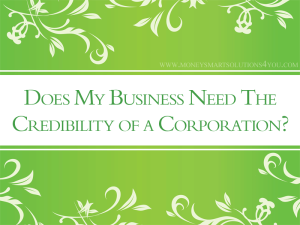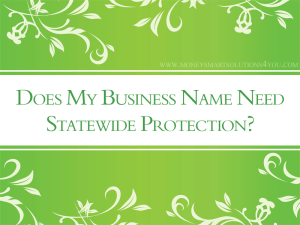I get a lot of questions about being a corporation. Should I do it now? Should I wait? Please don’t become a corporation because your brother-in-law thought it was a good idea (unless your brother-in-law is an attorney, tax professional or business expert). The answer will be based on the cost and benefits and is largely determined by how much money is being generated by your business and what your personal risks are from your business activities. There are 5 questions you should ask and answer in order to make the best decision for your personal circumstances.

Question 1: Will becoming a corporation save me money at tax time? Your tax professional can help you answer this. Remember that you will have the cost of legally setting up the corporation, you have annual compliance hoops to jump through for maintaining your corporate status, you cannot maintain your financial records haphazardly and at tax time you will have to pay for two tax returns--personal and corporate. All of these will cost you money and time. Additionally, the State of California will want $800 each year even if you are not profitable. Be sure you know what the costs are going to be before becoming a corporation and whether or not any tax benefits will exceed those costs now or in the future.

Question 2: Do I have assets that need protection from liability? Corporations offer a higher level of liability protection for your assets. Please remember this only applies if your corporation is in compliance and good standing. Additionally, you are going to need insurance whether you’re a sole proprietor or a corporation. Your insurance broker can give you guidance on how much and the kind of insurance you should have. An attorney can guide you on the liability issue.

Question 3: Does my business need the credibility offered by being seen as a corporation? In some communities being a corporation would be detrimental. A small, organic foods restaurant may find that being incorporated would create an identity crisis (by the way, there are ways to be incorporated and still look home grown). Alternatively, a start-up electronics company might want to look like it has longevity. Having a corporate name would assist with this perception.

Question 4: Does my business name need protection? Selecting and protecting our business names is very important. Being a corporation allows you to protect your name across the state while your Fictitious Business Name only works within the county where it is recorded. I would note that when you are thinking of starting a business or developing your name and brand, be sure that no one else is already using it. The state does not allow you to take a corporate name that is too similar to someone else’s. You don’t want to invest time, money and spirit into a name that is already claimed and to which you will ultimately have no right.

Question 5: Do I want to get paid through a payroll check? I find that this question is seldom asked and there are some real benefits to being paid this way. Sole proprietors get paid by way of an owner’s draw -- which is not tax deductible. However, corporations can pay their owners a regular paycheck with all of the same benefits offered other employees and this is tax deductible. Seek your tax professional’s assistance to determine the timing and requirements of making this choice.





